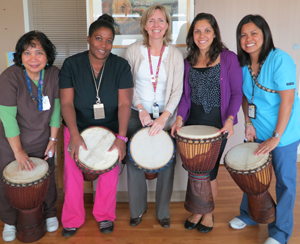Music therapy in patient-centred care is gaining prominence, especially in the treatment of cancer. Music can be used to help manage pain, reduce anxiety and improve quality of life.
 For the first time at PMH, inpatients can experience music therapy, working with SarahRose Black, a summer intern who is a graduate student in Music Therapy at Wilfred Laurier University. SarahRose, who must complete 1,000 internship hours to become an accredited music therapist, is working with patients on the hematology and palliative units.
For the first time at PMH, inpatients can experience music therapy, working with SarahRose Black, a summer intern who is a graduate student in Music Therapy at Wilfred Laurier University. SarahRose, who must complete 1,000 internship hours to become an accredited music therapist, is working with patients on the hematology and palliative units.
"I knew music therapy would generally be a new experience for a lot of staff and patients, and I wanted to add to the ever-evolving culture of care here at PMH," says SarahRose. "I've always been inspired by the dedication of the staff, and the hospital's willingness to embrace various forms of care that work in tandem with – and even go beyond – traditional medical practice."
SarahRose describes four main mediums of music therapy that benefit patients and do not require prior musical experience:
-
Clinical improvisation: A creative process involving the patient's spontaneous creation of sounds and music. The improvisational experience helps foster a therapeutic relationship and offers a venue for creative self-expression and non-verbal communication.
-
Receptive music therapy: This therapy does not include active music-making by the patient. The music therapist takes cues from the patient on subtle movement, breathing or finger tapping. Listening to music can be relaxing, may decrease anxiety and can offer comfort and emotional support.
-
Active playing: The patient plays different instruments, sometimes accompanied by the music therapist.
-
Song-writing: The patient works with a music therapist to put their experiences into song – this often involves the patient writing a letter and the music therapist developing an instrumental score to accompany the words.
SarahRose recalls one palliative care patient who was coping with some issues involving her children. SarahRose conducted several music therapy sessions around anxiety and stress relief. She suggested songwriting and asked the patient to write down her thoughts, from which she developed lyrics. She then recorded the song for the patient and made copies for the patient's children. The patient requested that song be played at her funeral.
This is not an uncommon music therapy request – many experienced music therapists do extensive "legacy work" for patients, which may include creating a collection of meaningful songs to share with family and celebrate their lives after they die.
Trish Murphy-Kane, Clinical Nurse Specialist in Palliative Care, who has worked with SarahRose, explains: "The music flows from the patients' rooms and onto the unit – what you see are the shoulders of staff relaxing and the smiles on their faces. The patient benefits are enormous – we're making them feel like a person again. We're making the family feel like they are not in hospital, but in their home enjoying the music together."
This summer, SarahRose also developed Drumming for Wellness, a music therapy program designed to offer staff an opportunity to relieve job-related stress and help process the issues they face on a daily basis.
"The staff already spend so much time together focused on patient care," says SarahRose. "If I can offer a venue for communicating non-verbally, it can be cathartic and enhance the community that already exists."
SarahRose is planning to conduct research on the impact of music therapy on a palliative care unit in a cancer care facility. She hopes to observe up to 10 patients on the palliative unit at PMH and use the data to support her hypotheses that music therapy improves quality of life.
"It's an honour to connect with people using music; when I walk into a patient's room, we're strangers," says SarahRose, "but music often dissolves the divide between us, and powerful connections can be formed."
